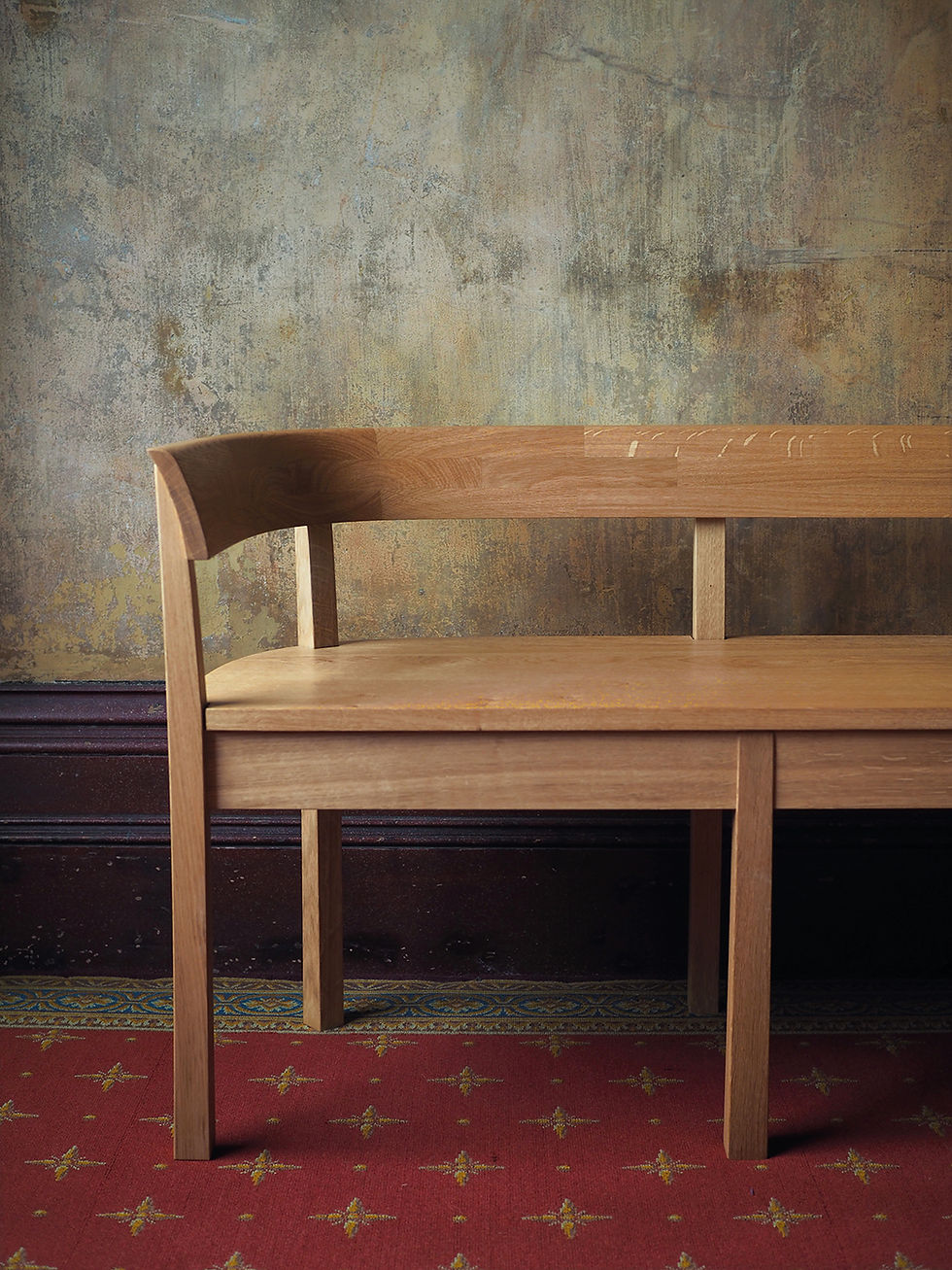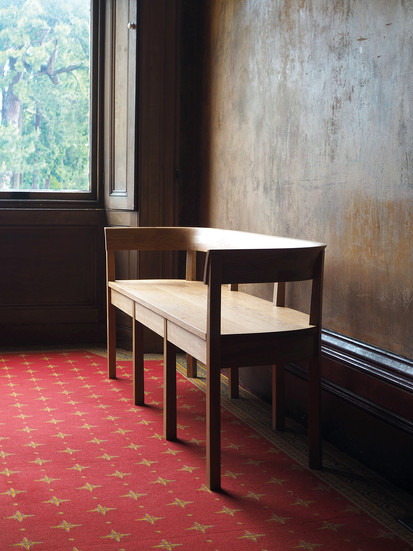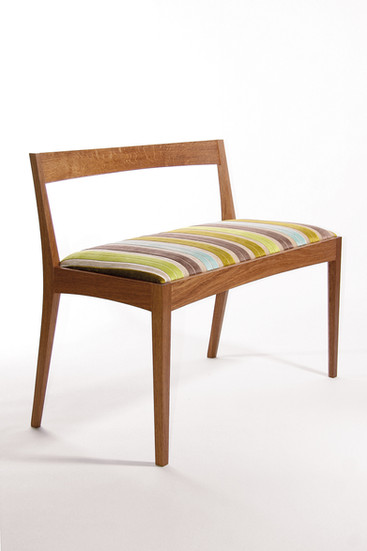Handmade histories
- Sep 16, 2025
- 5 min read
Words by Mercedes Smith
Christian O’Reilly’s beautiful bespoke furniture brings something special to the story of your family.

Christian O’Reilly is one of those craftsmen who has built the dream life, one that balances raising a family in rural Cornwall with his passion for making, and never compromising on the quality of his work. Those things can be a challenge in today’s design world, where the handmade must hold its own against society’s taste for the immediate. But there is change in the air: post-pandemic, the arts are seeing a resurgence of appreciation for the handmade, and a renewed pride in our master craftspeople.
Christian is a maker that the South West can be especially proud of. He began his career as an apprentice prop maker at the English National Opera, before relocating to Devon to train with acclaimed furniture designer David Savage at Rowden Atelier. Now a highly respected maker in his own right, he specialises in creating beautiful bespoke furniture, one exquisitely crafted piece at a time, for clients who appreciate the integrity of original objects made with skill and precision.
Christian’s studio is located in a quiet rural spot near Marhamchurch on Cornwall’s north coast. When I visit, the first thing he shows me, very quietly, is the studio’s letterbox, which houses a family of newly hatched sparrows. A note taped to its front reads ‘Do Not Use This Letterbox, Chicks Inside’. It is a charming metaphor for the daily priorities of a craftsman who values the environment and works only with timbers certified by the Forest Stewardship Council, which supports sustainable forestry practices, controlled harvesting and the protection of wildlife habitats. Christian is also a member of MAKE Southwest’s Green Maker Initiative, launched in 2021 in partnership with the ERDF-funded Low Carbon Devon project at the University of Plymouth, which invites makers to pledge to improve their environmental actions through a series of simple commitments year on year.
The interior of Christian’s workshop is as busy as you would expect it to be, with offcuts of wood, curled shavings, sawdust, pencils, paper and a variety of tools strewn everywhere. In the centre of the space, however, Christian’s current work in progress exudes a tranquil presence. It is a beautiful, golden bench made from oak, with sloping, curved and convex surfaces built from multiple sections that exceed my understanding of the mathematics and geometry of master carpentry. The more I look, the more I see the wonderful subtleties of its form, from the way the woodgrain accentuates its curves to the almost imperceptible fluting of its legs. Already three weeks in development, this piece will take a month’s full-time work before it can be delivered to South Yorkshire’s Brodsworth Hall, as commissioned by English Heritage. It is a singular example of the design talent, technical skill, intense labour and huge time commitment inherent in the making of Christian’s bespoke furniture. Over his twenty-year career, he has undertaken numerous commissions like this for clients including the Whitworth Art Gallery in Manchester, Westonbirt Arboretum in Gloucestershire, York Art Gallery and Centre of Ceramic Art, the Royal Albert Memorial Museum and Art Gallery in Exeter, and National Trust and English Heritage properties, but what he enjoys equally are domestic commissions from private clients.
“It’s so rewarding to create statement pieces that will last and be loved in one home by one family,” he says, “perhaps for generations. That’s quite a privilege, I think. Bespoke furniture, by its very nature, is an important addition to the story of any space, and to the story of the people who live there. Each piece I make begins with the moment it was first imagined by my client, and my role is to take that thought and turn it into an object that fits seamlessly into their lifestyle and home, as if it had always been there.”
All commissions begin with a consultation between Christian and his clients, “and typically a visit to the space where the furniture will sit,” he says. “The scale and style of the architecture, the other objects in the space or the way the light falls in a room, those are all important considerations in designing the perfect piece. Some are even commissioned with one particular person in mind,” he adds, “say a dressing table, or a desk for a private study. In those cases, it is essential to understand my client’s exact preferences in terms of function, and to make the piece to their physical proportions.”
Perhaps the best example of this, as exhibited at MAKE Southwest and the Bovey Tracey Craft Festival in 2024, is Christian’s much-admired Alice Chair. Designed originally for Christian’s wife, it is tailored to fit her exact measurements and way of sitting, and defines Christian’s ability to balance the exacting qualities of bespoke work with the integrity of heritage craft and the beauty of contemporary design.
“Solving the client’s brief, in a way that fulfils its necessary function but is also beautiful, is the key to a really impactful piece of work,” says Christian. “I love that challenge, and the entire process of bespoke work, from that first consultation to the conceptual drawings, to that moment when discussion and design turn to making, to delivery, when the piece is placed in situ and everything comes together. There’s a rhythm to it, and it’s incredibly rewarding.”
Christian will even document the making of a piece, from sketch to finished work, as a printed and bound photo book. “I first came up with that idea during lockdown,” he tells me, “when my clients couldn’t come in to the workshop. It seems a lovely way to celebrate the story of a bespoke project.”
The Alice Chair has since inspired other commissions of its type, in various woods and with various types of upholstery. “Clients will often have a preferred fabric in mind,” says Christian, “or we can direct them to quality fabric suppliers like Osborne & Little or Designers Guild. Certain patterns and colours can add an extra layer of personality to a bespoke piece of furniture, and really define it as a stand-out object in the room.”
Among such stand-out objects is the Meadow floral chair Christian made for exhibition at Devon’s MAKE Southwest, in collaboration with Shibori artist Michelle Griffiths and traditional upholsterer Neil Kitteridge. “Each flower was handmade by Michelle, using fabric dyes she created from the shavings of the Sweet Chestnut used to make the chair,” he explains. Unique chairs, Christian tells me, are always in demand, perhaps because they hold space for those special moments in our day, as places to read, to sit and talk with friends, or simply as sculptural design objects in a quiet corner. We discuss the decadence of a chaise longue, built for beauty and for carelessly thrown clothes, or the family feel of a hallway bench, where wellies are pulled off or mittens pulled on. Furniture, we agree, absorbs love and memory, and is therefore the most important of all heirlooms.

“People often talk to me about the joy of inheriting a treasured piece of furniture, and all the memories they associate with it. Objects that are passed down through families are so important because they connect us to the people who commissioned or came to own them. That is essentially what people are acquiring when they commission work from me. They are bringing something special not just to their home, but to the history of their family.”






















